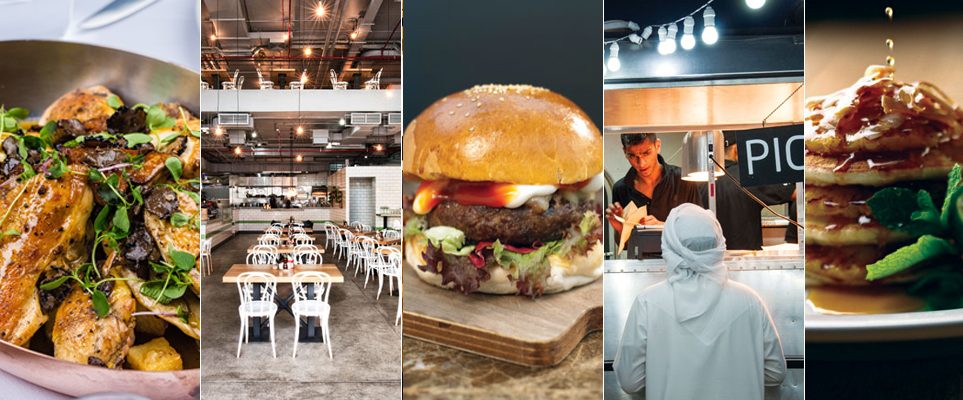



The UAE is one of the world’s leading food and beverage markets, worth Dh52.4 billion in 2015, according to global market research group Euromonitor.
Dubai alone has about 7,500 places to eat, from street cafes and fast-food outlets to fine-dining and high-end restaurants established by big-name chefs. Many will showcase their best dishes during Dubai Restaurant Week, which ends on Saturday.
Jean-Luc Naret, both the former F&B senior vice president for Jumeirah Group and publisher of the Michelin Guide, predicts that within a few years Dubai will be one of the top culinary destinations in the world. But, as part of that evolution, the city appears to be undergoing something of an adjustment.
The head chef of a new Dubai restaurant at a big-name hotel, who asked not to be named, said it had received more than 100 positive reviews in newspapers and magazines, and on websites and social media, yet this had not translated into footfall.
You can walk into most restaurants without booking. It is not unusual for your party to be the sole diners for most of the meal – even at good restaurants with excellent food.
Supply is set to increase, with 138 hotel projects under way across the city. Figures released at the Hotel Show Dubai last year revealed that 59 of those are set to open in 2017. With new hotels come new restaurants, as it is unthinkable for a four- or five-star hotel to open without at least one high-end eatery – and probably several. Atlantis, The Palm, for example, has 23 restaurants, including a Nobu, Giorgio Locatelli’s Italian restaurant, Yuan (from chef Jeff Tan, formerly of Hakkasan Mayfair) and Gordon’s Ramsay’s Bread Street Kitchen & Bar.
But there appears to be some economising. KPMG’s 2016 UAE Food & Beverage Report shows that as a result of price increases, 19 per cent of 840 survey respondents said they eat out less, and 28 per cent are more conscious of what they order. A survey of more than a dozen UAE businesses revealed that 48 per cent expect a decline in the next 12 months.
"Operators might be well advised to take a cautious approach – trying to achieve growth through continually opening new outlets or rapid geographical expansion could be unsustainable," notes KPMG. "In the longer term, the appeal and the quality of the concept will determine success."
This view is echoed by some of Dubai’s top chefs.
"The majority of restaurants in town are experiencing a dip in sales due to the slight decrease of tourism in the region, but the amount of new restaurants opening also plays a part," says Christopher Graham, executive chef at At.Mosphere Burj Khalifa. "Many Dubai staples that have been here for years are finding the need to diversify, rebrand and stay relevant to compete with all of the new innovations.
"Looking at the high-end casual restaurants, brasseries and fast-casual outlets, there is definitely a saturation. With a lot of money in the city, it’s very easy for people to just get an investor and open a restaurant – quite a lot of the time they aren’t doing their homework and going under just as quickly."
Graham believes the proposed introduction of value added tax, likely next year, will make things even tougher.
"In a market already considered to be expensive, anything that can drive the cost of sales up is a potential risk," he says.
Stephane Cocu, executive head chef at La Serre Bistro and Boulangerie, is also wary of the number of new restaurants about to open, expat turnover and fluctuating tourism numbers.
"Dubai is small and 60 new restaurants will probably be too much," he says.
"Let’s see how many will make it after the first three months."
Yet this can also be viewed as a natural step in the emirate’s culinary evolution.
Andrew Morrow, head of F&B development and operations at Ròya International, a Mena-region specialist hospitality consultancy firm, points out that regular closures are a positive sign.
"The market needs to mature and I would say in the past 18 to 24 months we’ve seen that maturation," he says, "and we’re referencing Dubai being similar to London, New York, Sydney, the big international cities. Part of that spectrum is restaurant closures. In the next two years you will start to see a significant amount of failures in the industry, and that’s not saying Dubai is a failure but it’s just one of the world players. You have openings, and for every opening you’ll have a closure because there are only so many mouths to feed."
In Dubai there is one place to eat for about every 280 inhabitants. In New York, it is one for about 420, so an adjustment here is due, and competition should even things out. As Cocu points out, restaurants that compromise on quality will go.
"In my experience, lots of new restaurants start with high-quality ingredients and service but then as soon as the covers go down, the rest follows," he says. "This is the beginning of the end.
"We... have never compromised on the quality of our food and the focus on good service. These are the two paramount factors to succeeding in Dubai and surviving in the long-term."
The organisers of Dubai Restaurant Week declined to comment.
♦ By: Matt Pomroy
